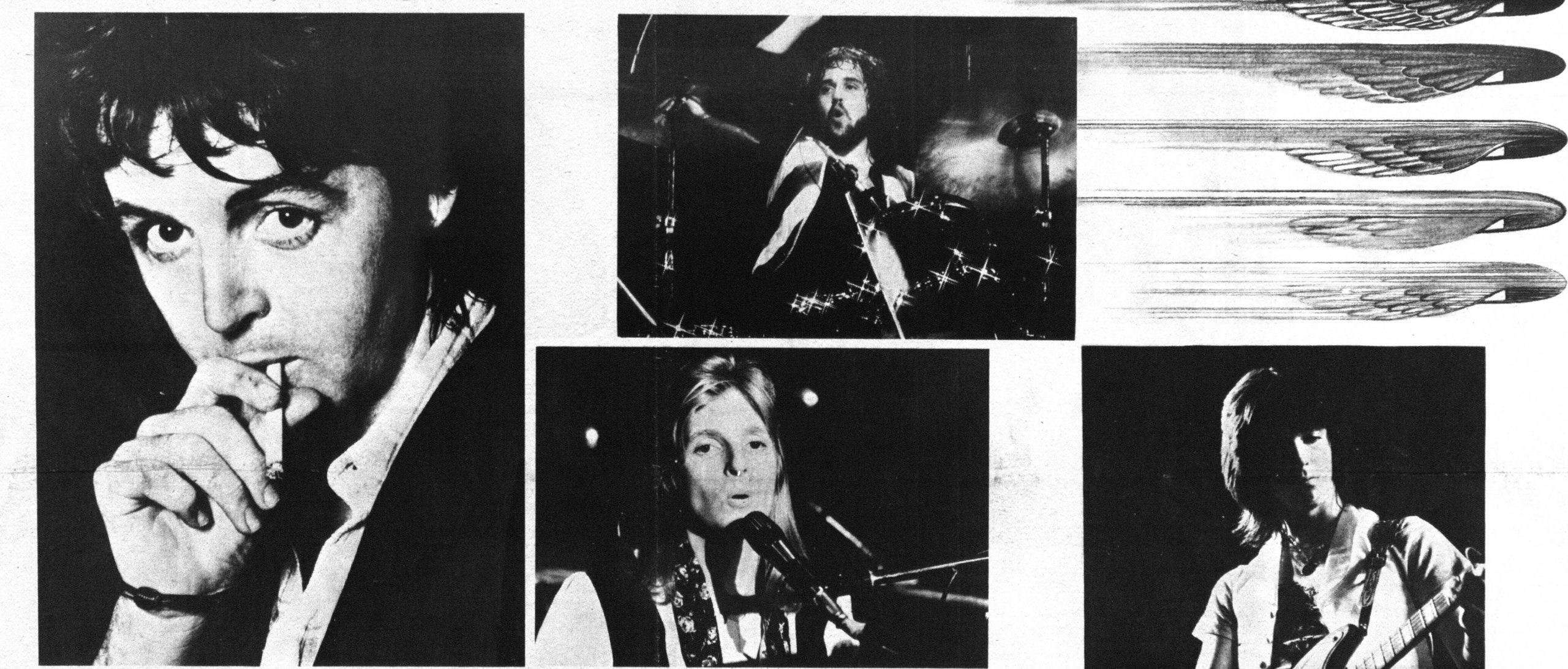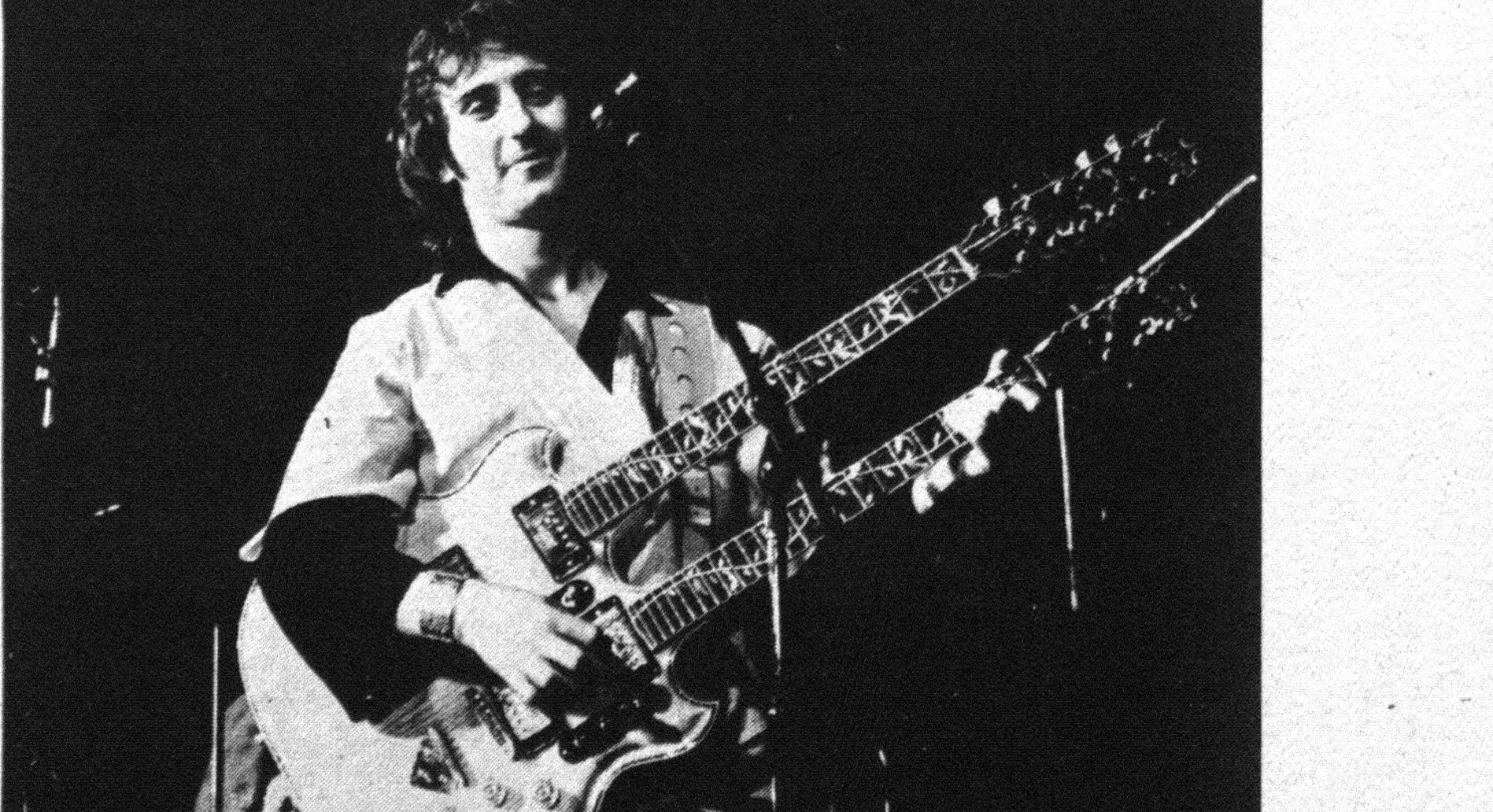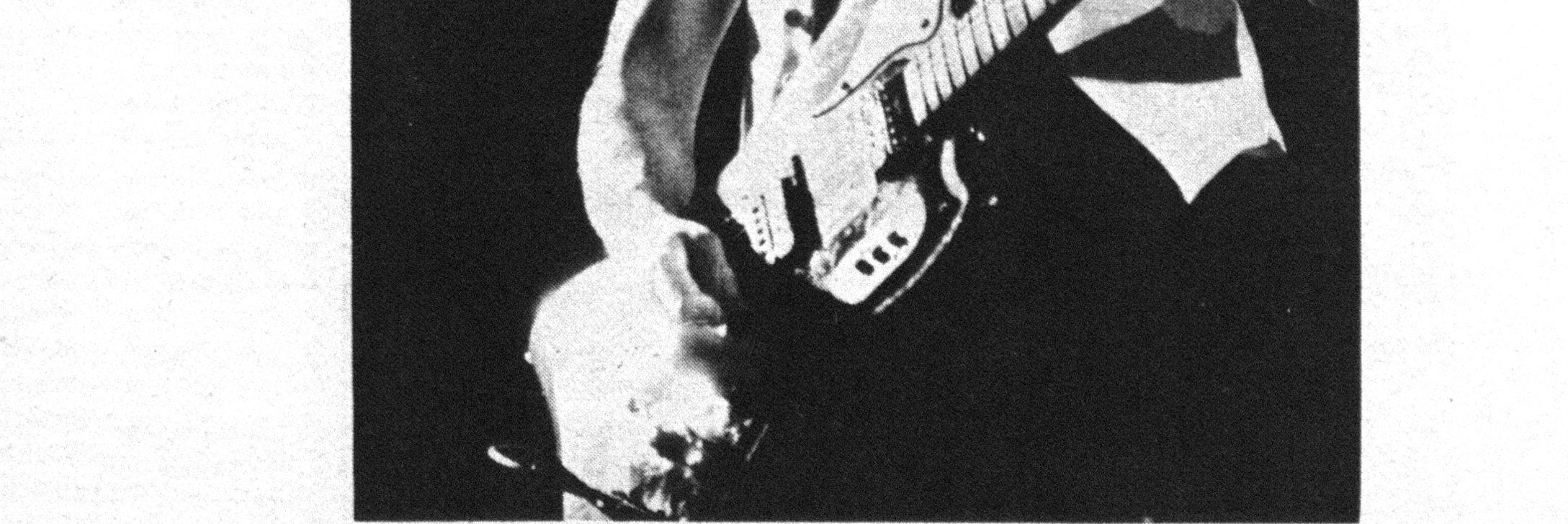|
Page 8 |
R.A.T.W. |
R.A.T.W. |
Page 9 | |||
PAUL McCARTNEY and WINGS
the second band… on the run
liter years of varied preparation, Paul McCartney Wings are due to start their first American tour. It begins in May and criss-crosses the States for two months, playing in large halls and arenas, mostly in big cities. This man, who hasn’t set foot on an American stage in almost ten years, is siemanding the respect only playing bass in The Beatles could possibly accord someone. As one of the modern architects of present-day rock & roll, Paul has carefully constructed his newest version of Wings. making it tougher, more confident of its stature. and more committed to rock rather than pop…
Performing up to twenty-nine songs per show, Paul has wisely inserted some old faves ( including five Beatles songs: ‘Yesterday’, ‘Lady Madonna’, ‘Blackbird’, ‘I’ve Just Seen A Face’. and ‘The Long and Winding Road’) for the sake of longtime fans who would certainly be disappointed at the absence of past hits. Having finally maintained a proper balance of musicians. Paul is able to offer a diverse show, complete with a solo section for different Beatle tunes. Probably a perfectly planned. well-staged show. No wonder Paul has felt it possible to tour the world. Already, Wings have scored huge successes during their recent Australian and Japanese tour ( with three sold-out concerts in Budokan Hall in Tokyo). The American tour had to be postponed a month because Jimmy McCulloch broke his left hand after a concert in Paris. Delayed, but undaunted…
Paul McCartney has credited Little Richard, Carl Perkins, Elvis. and Billy Cotton as major influences in his musical heritage. His father. James McCartney, taught him piano, harmony, and a general appreciation of music ( including opera, which Paul still doesn’t care about). While growing up in Liverpool, skiffle music provided Paul- with his first accessible outlet for live performance. Through a friend, he met a band called the Quarrymen, who chose to perform cover versions of obscure American R & B tunes (i.e. – it was the Del-Vikings’ hit, ‘Come Go With Me’, with different lyrics, that Paul first heard John singing upon entering the dance hall). At a party afterwards, Paul, flaunting one of his esoteric covers (Eddie Cochran’s ‘Twenty Flight Rock’), managed to impress the group’s leader, John Lennon. And in a very short time, Paul was part of the band – as well as striking up a partnership with John in writing the band’s tunes, some of which have never been recorded (‘Suicide’, ‘Just Fun’, ‘Too Bad About Sorrow’), but served as constant measure of their pursuit in mastering the rock & roll song format..
world tours, with their split-second, hair-raising schedules and itineraries); in their modes and dress ( from boots…hairstyles…stove-pipe pants…collarless suits…psychedelia…Maraharijis… corporate control of their own record company…drug busts). Inadvertently, their personalities reflected the trends of the times, which, in turn, helped create this musical and cultural force which is still felt even now…
Realizing this, Paul enlisted the aid of his wife, Linda, guitarist Denny Laine, and drummer, Denny Seiwell to form Wings ( I). They recorded ‘Wildlife’ and hit-the-road for a mini-tour of British schools and colleges in the spring of 1972. While financially limiting, the tour gave Paul his first taste of audience reaction in six years, and just whet his desires even more…
In 1959, the group became the Moondogs. Then, after a few more name changes, the Silver Beatles. They had added a raunchy, guitar-playin’ schoolmate of Paul’s – a shy, young George Harrison. The band tightened vocally, developing their three-part harmonies, and instrumentally, carving out their own brand of raw, frantic rock & roll. On tour in Hamburg, the Beatles met Richard Starkey (the impressive drummer from the anemic Rory Storm and The Hurricanes) and adopted the ‘beatle-cut’ ( copped from Hamburg’s loyal following of art students, who attended their Star Club marathons). Eventually, the band netted Ringo, a recording
contract, and stardom (eventually…STARDOM!) as big as Sinatra or Elvis…even bigger…
The impact John, Paul, George and Ringo had on the world is truly staggering. The Beatles shaped a cultural and youth revolution that took effect in all corners of the globe. The Beatles became innovators: in the recording studios ( their first LP took one day to record – ‘Sgt. Pepper…’ took more than six months), on the concert stage ( Hunter Davies, author of the authorized Beatle-biography, credits Brian Epstein and the Beatles for setting the standards for major
Nostalgia buffs can only revel in the aura of ‘Beatlemania* a joyous mood that swept the world for three full years. Such total abandonment to a group seems increasingly improbable today. Cynicism has become a foundation of the fan phenomenon. The search for ‘the next big thing’ is a false premise, one that creative musicians and artists have no control of. The immediacy of the modern world inhibits musical ideals and promotes only visual idols…The Beatles won’t get back together for money, even if-though twenty five million intergalactic-credits is hefty incentive…groups should ( re)unite for musical expression-progression…this is part of the reason Paul formed Wings: to create music and play it live before a true audience (a task the Beatles were reluctant to do from ’66 – ’70)…another reason was his unwillingness to become an ‘ex-‘ legend while he’s still eager for new direction with a performing band…
In forming Wings, Paul McCartney has always maintained a low-key approach. After all, how does one follow the Beatles? So, Paul wisely shunned recording with session-men, who appeared on all his ex-mates’ albums, lending that homogenous sound to each performer’s work. He preferred to work alone or with friends-finally opting for the group approach, because that would be the only comfortable way for him to perform. A return to the ‘grass roots’ level in formation and execution seemed unavo.idable…
Wings II brought Henry McCulloch to the band as lead guitarist and prompted a 1973 tour of small concert halls in England and Europe. Paul had insisted on small venues because he believed a new band couldn’t demand top status, regardless of the personalities involved. The band needed to grow, and in its early stages Paul sought to minimize the fright of huge audiences, huge expectations, and intimidating critics. He realized completely the difficulties in piecing together a perfectly balanced and professional ensemble. The Beatles had taken seven years to organize, mostly as an underground phenomenon struggling for acceptance. Wings had an almost-impossible task of remaining anonymous until their line-up had settled – practically from the day they were formed…
The thrill of playing live didn’t overcome McCulloch and Seiwell, both of whom quit the band just before a trip to Lagos to record a new LP. The tight rapport of the remaining trio, Wings HI, is evident in their most famous and respected offering: ‘Band On The Run’. ( Remember: this LP set a precedent – the first time an album became No. I on two different occasions, just weeks apart). The success of their insistent touring proved even more worthy than instant acceptance. Paul, Linda & Denny were able to meld their musical growth toward a mastery of the recording studio…
Wings IV introduced Jimmy McCulloch, a spunky lead guitarist with grit, able to spur Paul on unlike any previous soloist. His debut track, the magnificent single ‘Junior’s Farm’, stands as one of Wings’ finest emotional and technical releases. Then, in early 1975 Paul added Joe English ( to replace Geoff Britten, whose work on ‘Venus & Mars’ is limited to only three songs), a drummer of enormous potential and flexibility. Wings had roosted…
With this important final addition, McCartney was finally satisfied with a band, that gave him the confident spark to plan a world-wide tour. Each member of the band is highlighted with assists on lead vocals or song composition: further demonstration of the democratic tendencies Paul has always insisted on, – actively reluctant for Wings to become his vehicle solely. With the release of ‘Speed of Sound’, his wish has been achieved: he is lead vocalist on only six songs ( though writing nine of eleven). These are the motivations that has made Paul’s post-Beatle resurgence so compelling.
He has never strayed from his designs for a collective outfit. He has ignored critical slagging ( of wife & band), choosing to explain, simply, that Wings hadn’t reached a level of rapid maturation. Rather, they evolved assuredly and slowly…
Okay the time is now here. This month. Wings open their tour in Fort Worth, Texas on May 3 and conclude in Los Angeles on June 22. Don’t forget to scream, applaud, and cheer. Wings need the encouragement. If anyone else has been keeping track, one might note that Paul saved America for last – reserving the U.S. tour as a mark of conclusive professionalism. Come on, America, let’s welcome Wings and Paul McCartney in a really grand way…
‘If there’s a Rock Show at the Concertgebow,
They’ve got long hair at the Madison Square
You’ve got Rock and Roll at the Hollywood Bowl
We’ll be there…oh yeah…*
Mr. Curt


